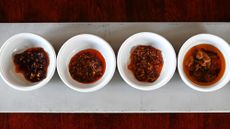Millions in the Pacific could be left without food, clean water due to El Niño

Because of the upcoming El Niño, more than four million people in the Pacific are at risk of experiencing water shortages, food insecurity, and disease, experts warn.
An El Niño happens when waters in the eastern tropical Pacific ocean become warmer, causing extreme weather conditions, and forecasters say this year's might be as intense as the 1997-98 El Niño, when about 23,000 people died. In Papua New Guinea's Chimbu province, where frost has killed off almost every crop and there is a record drought, 24 people have died from hunger and drinking contaminated water. Oxfam Australia's climate change policy advisor, Dr. Simon Bradshaw, told The Guardian that some areas of Papua New Guinea will run out of food in about two to three months. "People are almost exclusively reliant on subsistence farming, farming of sweet potatoes," he said. "We do know that water is becoming very scarce, that's of course impacting food production, and PNG is almost entirely dependent on its own food."
While El Niño brings more rain and flooding to countries near the equator, countries in the Pacific southwest will see drier and hotter conditions. Sune Gudnitz, head of the Pacific region office of the United Nations Office for the Coordination of Humanitarian Affairs, said Papua New Guinea, Fiji, Tonga, and the Solomon Islands are dealing with reduced rainfall, and drought conditions will "further complicate the humanitarian situation." In Fiji, water is being trucked into some villages, and water is being shipped to the outer islands of Tonga. Bradshaw said research research suggests El Niño patterns, which typically happen every three to seven years, could soon take place twice as frequently because of climate change. "We've seen an unprecedented run of extreme and erratic weather, which has had very real impacts," he said. "Of course, those impacts are felt first and hardest by the world's poorest communities, but these countries are also the least responsible for climate change. They've contributed negligibly to global greenhouse emissions."
Subscribe to The Week
Escape your echo chamber. Get the facts behind the news, plus analysis from multiple perspectives.

Sign up for The Week's Free Newsletters
From our morning news briefing to a weekly Good News Newsletter, get the best of The Week delivered directly to your inbox.
From our morning news briefing to a weekly Good News Newsletter, get the best of The Week delivered directly to your inbox.
Create an account with the same email registered to your subscription to unlock access.
Sign up for Today's Best Articles in your inbox
A free daily email with the biggest news stories of the day – and the best features from TheWeek.com
Catherine Garcia is night editor for TheWeek.com. Her writing and reporting has appeared in Entertainment Weekly and EW.com, The New York Times, The Book of Jezebel, and other publications. A Southern California native, Catherine is a graduate of the University of Redlands and the Columbia University Graduate School of Journalism.
-
 'Good riddance to the televised presidential debate'
'Good riddance to the televised presidential debate'Instant Opinion Opinion, comment and editorials of the day
By Harold Maass, The Week US Published
-
 Caitlin Clark the No. 1 pick in bullish WNBA Draft
Caitlin Clark the No. 1 pick in bullish WNBA DraftSpeed Read As expected, she went to the Indiana Fever
By Peter Weber, The Week US Published
-
 Today's political cartoons - April 16, 2024
Today's political cartoons - April 16, 2024Cartoons Tuesday's cartoons - sleepyhead, little people, and more
By The Week US Published
-
 OJ Simpson, star athlete tried for murder, dead at 76
OJ Simpson, star athlete tried for murder, dead at 76Speed Read The former football hero and murder suspect lost his battle with cancer
By Rafi Schwartz, The Week US Published
-
 Momofuku's 'Chili Crunch' trademark uproar
Momofuku's 'Chili Crunch' trademark uproarSpeed Read The company's attempt to own the sole rights has prompted backlash
By Rafi Schwartz, The Week US Published
-
 Kevin Hart awarded Mark Twain Prize
Kevin Hart awarded Mark Twain PrizeSpeed Read He is the 25th recipient of the prestigious comedy prize
By Peter Weber, The Week US Published
-
 Is Downton Abbey set to return for a final film?
Is Downton Abbey set to return for a final film?Speed Read Imelda Staunton reveals that a third movie may be in the pipeline
By Adrienne Wyper, The Week UK Published
-
 'Oppenheimer' sweeps Oscars with 7 wins
'Oppenheimer' sweeps Oscars with 7 winsspeed read The film won best picture, best director (Christopher Nolan) and best actor (Cillian Murphy)
By Peter Weber, The Week US Published
-
 'Rust' armorer convicted of manslaughter
'Rust' armorer convicted of manslaughterspeed read The film's cinematographer Halyna Hutchins was shot and killed by actor Alec Baldwin during rehearsal
By Peter Weber, The Week US Published
-
 The Beatles are getting 4 intersecting biopics
The Beatles are getting 4 intersecting biopicsSpeed Read Director Sam Mendes is making four separate movies, each told from the perspective of one band member
By Peter Weber, The Week US Published
-
 Taylor Swift to Miley Cyrus: female artists dominate 2024 Grammys
Taylor Swift to Miley Cyrus: female artists dominate 2024 GrammysSpeed Read SZA, Phoebe Bridgers and Lainey Wilson were also among the winners at LA gala
By Arion McNicoll, The Week UK Published